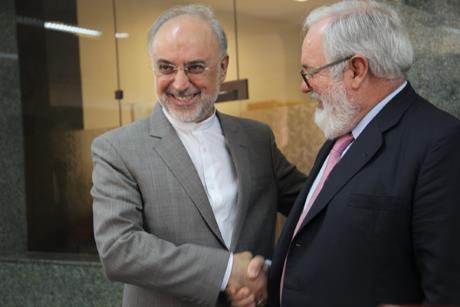EU-Iran cooperate on nuclear safety
22 April 2016
The European Commission and Iran are to launch their first nuclear safety cooperation project under a joint statement issued during an EU delegation's visit to Tehran.
 |
| Ali Akbar Salehi and Miguel Cañete at the Tehran meeting (Image: AEOI) |
The joint statement was released following a 17 April meeting of an EU delegation headed by climate action and energy commissioner Miguel Arias Cañete with Ali Akbar Salehi, Iran's vice president and head of the Atomic Energy Organization of Iran (AEOI).
According to the statement, the EC and the AEOI are to cooperate "in fulfillment of measures set out in the Joint Comprehensive Plan of Action" - the agreement signed in July 2015 by Iran and the E3/EU+3 (China, France, Germany, Russia, the UK and the USA - also referred to as the P5+1 - plus the European Union) under which Iran agreed to limit its uranium enrichment activities, eliminate its stockpile of medium-enriched uranium and limit its stockpile of low enriched uranium over the next 15 years.
The scope of the cooperation is to include an annual high-level meeting to review topics of common interest in the nuclear field, including nuclear safety, radiation protection, emergency preparedness and response, the management of radioactive waste and used fuel, nuclear research and development, and non-power applications of nuclear energy.
The first activities will take place this year, under an EU-funded project to enhance the capabilities of the Iran Nuclear Regulatory Authority (INRA). The project will include cooperation on the stress test process for existing and planned nuclear power stations; a feasibility study for establishing a nuclear safety centre in Iran; support to INRA to review jointly the country's regulatory framework, taking into account lessons learned from the Fukushima Daiichi accident; providing training for nuclear safety professionals; and collaboration in outreach activities such as the organization of an international conference on nuclear safety.
Further options for cooperation set out in the statement include joint fission and fusion research activities, including bilateral cooperation between research centres and cooperation with the ITER fusion project.
Researched and written
by World Nuclear News